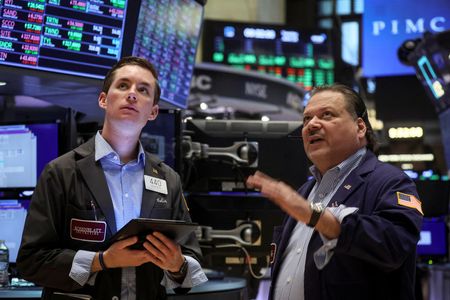 1
1 1
1

By Shreyashi Sanyal and Sruthi Shankar
(Reuters) – U.S. stock indexes tumbled on Thursday, with growth shares bearing the brunt of the selloff, after the Federal Reserve’s largest rate increase since 1994 to combat decades-high inflation fanned worries of a recession.
All of the 11 major S&P sectors fell in morning trade. Energy and consumer discretionary sectors were the top losers, down 4.2% and 3.6%, respectively.
Mega-cap growth firms Amazon.com, Microsoft Corp, Apple Inc and Tesla Inc slid between 2.5% and 6%, also pressured by rising U.S. Treasury yields.
By 09:56 a.m. ET, all the Dow components were in the red, while 496 constituents of S&P 500 index fell.
The benchmark index snapped a five-session losing streak on Wednesday after the Fed’s 75 basis point rate increase matched market expectations.
Equities have been under pressure for most of the year on growing worries about surging inflation and higher borrowing costs, with the central bank’s latest projection of a slowing U.S. economy and rising unemployment in the coming months only fueling those concerns.
“We view it as increasingly likely that a recession and higher unemployment will be necessary to tame inflation: with such a gloomy macro picture looming over the markets,” said Geir Lode, head of global equities at Federated Hermes Ltd.
Wells Fargo said the odds of a recession now stand at more than 50%, following the Fed decision.
The S&P 500 is down 22.6% year-to-date and is in a bear market as investors grapple with a sharp slowdown in growth. The Nasdaq Composite and the S&P 500 indexes were set to mark their 10th weekly decline in the past 11 weeks.
“Technically, the market remains weak,” said Peter Cardillo, chief market economist at Spartan Capital Securities in New York.
“The Fed rally is fading as investors question the central bank’s ability to orchestrate a soft landing. The bear market is in full force still and yet to reach a level where stocks can comfortably bounce off of.”
At 9:56 a.m. ET, the Dow Jones Industrial Average was down 692.04 points, or 2.26%, at 29,976.49, the S&P 500 was down 105.57 points, or 2.79%, at 3,684.42, and the Nasdaq Composite was down 355.94 points, or 3.21%, at 10,743.21.
Among major U.S. banks, Morgan Stanley led losses with a 4% slide.
The CBOE volatility index, also known as Wall Street’s fear gauge, rose to 31.51 points.
Declining issues outnumbered advancers for a 15.15-to-1 ratio on the NYSE and for a 7.14-to-1 ratio on the Nasdaq.
The S&P index recorded one new 52-week highs and 78 new lows, while the Nasdaq recorded three new highs and 400 new lows.
(Reporting by Sruthi Shankar and Shreyashi Sanyal in Bengaluru; Additional reporting by Medha Singh; Editing by Anil D’Silva and Sriraj Kalluvila)